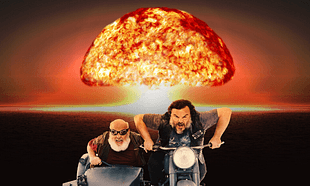Returning four years after the acclaimed 'White Chalk', Polly Jean Harvey's current preoccupation lies with her mother country, particularly her role in numerous bloody wars throughout history and in modern times. Once again working with frequent collaborators John Parish and Mick Harvey, PJ wrote much of 'Let England Shake' on autoharp, giving the album a vast, airy feeling that belies its serious undertones.
It's strange and slightly unnerving that, considering its brutal subject matter, Harvey sounds more soft and feminine here than ever before, singing with a much more delicate timbre than on previous records. Stretching herself beyond her normal range, Harvey creates an intense and provocative atmosphere on the Gallipoli-referencing 'On Battleship Hill', evoking vivid images of a fire-scorched and smoke-filled battlefield, despite the fact that Polly can't quite comfortably reach those high notes.
Harvey's insistence on inserting recordings that are not only at odds, but also out of sync and out of key with her melodies is both fascinating and infuriating. Though the sample of Niney The Observer's 'Blood and Fire' works perfectly on 'Written On The Forehead', elsewhere similar strategies (the battle horn on 'The Glorious Land' and an old recording of Said El Kurdi from 1920's Baghdad on 'England') are purposely awkwardly constructed, challenging the listener to assess their meaning and significance in this new context.
Though an undoubtedly bleak record (particularly the daunting lyrics of 'All and Everyone'), the triumph of 'Let England Shake' is that it never feels miserable or depressing. Perhaps this is because, despite Harvey's scathing words, despite her rage and disappointment, a certain affection for her homeland still remains, however indignant. Though not what you might call light listening 'Let England Shake' marks a new level for PJ Harvey, and is as thought-provoking as it is mesmerising.








































































